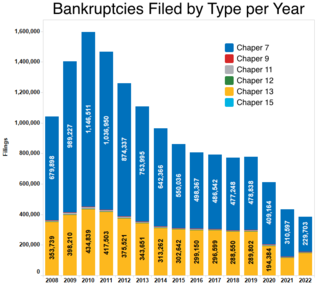
The Uniform Commercial Code (UCC), first published in 1952, is one of a number of uniform acts that have been established as law with the goal of harmonizing the laws of sales and other commercial transactions across the United States through UCC adoption by all 50 states, the District of Columbia, and the Territories of the United States.

A lien is a form of security interest granted over an item of property to secure the payment of a debt or performance of some other obligation. The owner of the property, who grants the lien, is referred to as the lienee and the person who has the benefit of the lien is referred to as the lienor or lien holder.
A creditor or lender is a party that has a claim on the services of a second party. It is a person or institution to whom money is owed. The first party, in general, has provided some property or service to the second party under the assumption that the second party will return an equivalent property and service. The second party is frequently called a debtor or borrower. The first party is called the creditor, which is the lender of property, service, or money.

In the United States, bankruptcy is largely governed by federal law, commonly referred to as the "Bankruptcy Code" ("Code"). The United States Constitution authorizes Congress to enact "uniform Laws on the subject of Bankruptcies throughout the United States". Congress has exercised this authority several times since 1801, including through adoption of the Bankruptcy Reform Act of 1978, as amended, codified in Title 11 of the United States Code and the Bankruptcy Abuse Prevention and Consumer Protection Act of 2005 (BAPCPA).
Hypothec, sometimes tacit hypothec, is a term used in civil law systems or mixed legal systems to refer to a registered non-possessory real security over real estate, but under some jurisdictions it may sometimes also denote security on other collaterals such as securities, intellectual property rights or corporeal movable property, either ships only as opposed to other movables covered by a different type of right (pledge) in the legal systems of some countries, or any movables in legal systems of other countries. Common law has two main equivalents to the term: mortgages and non-possessory liens.
Repossession, colloquially repo, is a "self-help" type of action, mainly in the United States, in which the party having right of ownership of the property in question takes the property back from the party having right of possession without invoking court proceedings. The property may then be sold by either the financial institution or third party sellers.
In finance, a floating charge is a security interest over a fund of changing assets of a company or other legal person. Unlike a fixed charge, which is created over ascertained and definite property, a floating charge is created over property of an ambulatory and shifting nature, such as receivables and stock.
In finance, a security interest is a legal right granted by a debtor to a creditor over the debtor's property which enables the creditor to have recourse to the property if the debtor defaults in making payment or otherwise performing the secured obligations. One of the most common examples of a security interest is a mortgage: a person borrows money from the bank to buy a house, and they grant a mortgage over the house so that if they default in repaying the loan, the bank can sell the house and apply the proceeds to the outstanding loan.

The Bankruptcy and Insolvency Act is one of the statutes that regulates the law on bankruptcy and insolvency in Canada. It governs bankruptcies, consumer and commercial proposals, and receiverships in Canada.
Secured transactions in the United States are an important part of the law and economy of the country. By enabling lenders to take a security interest in collateral, the law of secured transactions provides lenders with assurance of legal relief in case of default by the borrower. The availability of such remedies encourages lenders to lend capital at lower interest rates, which in turn facilitates the free flow of credit and stimulates economic growth.
In law, perfection relates to the additional steps required to be taken in relation to a security interest in order to make it effective against third parties or to retain its effectiveness in the event of default by the grantor of the security interest. Generally speaking, once a security interest is effectively created, it gives certain rights to the holder of the security and imposes duties on the party who grants that security. However, in many legal systems, additional steps --- perfection of the security interest --- are required to enforce the security against third parties such as a liquidator.
A secured loan is a loan in which the borrower pledges some asset as collateral for the loan, which then becomes a secured debt owed to the creditor who gives the loan. The debt is thus secured against the collateral, and if the borrower defaults, the creditor takes possession of the asset used as collateral and may sell it to regain some or all of the amount originally loaned to the borrower. An example is the foreclosure of a home. From the creditor's perspective, that is a category of debt in which a lender has been granted a portion of the bundle of rights to specified property. If the sale of the collateral does not raise enough money to pay off the debt, the creditor can often obtain a deficiency judgment against the borrower for the remaining amount.
A UCC-1 financing statement is a United States legal form that a creditor files to give notice that it has or may have an interest in the personal property of a debtor. This form is filed in order to "perfect" a creditor's security interest by giving public notice that there is a right to take possession of and sell certain assets for repayment of a specific debt with a certain priority. Such notices of sale are often found in the local newspapers. Once the form has been filed, the creditor establishes a relative priority with other creditors of the debtor. This process is also called "perfecting the security interest" in the property, and this type of loan is a secured loan. A financing statement may also be filed in the real estate records by a lessor of fixtures to establish the priority of the lessor's rights against a holder of a mortgage or other lien on the real property. The creditor's rights against the debtor and the lessor's rights against the lessee are based on the credit documents and the lease, respectively, and not the financing statement.
Strict foreclosure in the law of security interests in the United States, is the foreclosure of personal property that is subject to such an interest. This is permitted under Article 9 of the Uniform Commercial Code. The secured party in a strict foreclosure takes physical possession of collateral, and the debt for which the property served as collateral is discharged as fulfilled. Strict foreclosure is an effective remedy where the creditor has a need or use for the physical property itself. For example, a seller of goods that forecloses on goods in which it had a purchase money security interest (PMSI) may then return the foreclosed goods to its inventory and resell them at its leisure. Similarly, a company that operates equipment and sells some surplus equipment can put the foreclosed equipment back into the service of the company. Strict foreclosure is also an effective remedy where the value of the goods foreclosed is the equivalent of the debt due and owing, and the creditor can easily sell the goods for that value.
UCC Insurance generally insures the attachment, perfection and priority of security interests in personal property. UCC Insurance is utilized for transactions described in Article 9, "Secured Transactions", of the Uniform Commercial Code,"UCC". All of the larger land-title insurance companies now offer various versions of UCC insurance. The policies contain significant differences, but tend to serve the same purpose.
The Personal Property Securities Register (PPSR) is an electronic register that allows security interests in personal property to be registered and searched in accordance with the New Zealand Personal Property Securities Act 1999 and the Australian Personal Property Securities Act 2009.

Commercial insolvency in Canada has options and procedures that are distinct from those available in consumer insolvency proceedings. It is governed by the following statutes:

Bank of Montreal v Innovation Credit Union is a decision of the Supreme Court of Canada that deals with the priority of unregistered security interests of a creditor against a security interest created later by a chartered bank under the Bank Act.

Caisse populaire Desjardins de l'Est de Drummond v Canada is a Canadian income tax law case of the Supreme Court of Canada that has wide-ranging application to other areas of federal and provincial jurisdiction when dealing with cash collateral arrangements and security interests.





